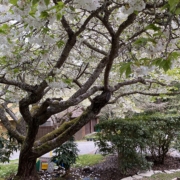
From photobucket…though this looks exactly like our mongrel, Duke, from my childhood. A thoroughly mischievous dog (who soon disappeared from our menagerie), but full of joy.
As my husband has generously pointed out, the paperwork sent home with me the other day from the orthopedic visit specifies a lateral malleolus fracture. The x-ray report in my GHC inbox states:
1. OBLIQUE NONDISPLACED FRACTURE OF THE DISTAL FIBULA.
2. OSTEOCHONDRAL FRACTURE OF THE LATERAL TALAR DOME.
I have been doing some time-tripping. I’m rereading Kate Atkinson’s 2013 novel, Life After Life…which is a time-trip even the first time through. Our heroine, Ursula (“Little Bear,” as her father affectionately calls her), dies at birth — comes back, dies as a very young child in a swimming accident — comes back, dies in a fall from a roof, and so on. In some lives she is brutalized by the sort of people she cannot comprehend (her mean older brother’s suave yet oafish American college friend, for instance); she meets Adolf Hitler; in one life she marries a thoroughly detestable man; in another life she marries a flawed man (well, are there any other kind?), but eventually, every time, she gets a chance to do it differently. It’s a brutal book in its way. So brutal that I hesitate to recommend it to you. But maybe that’s just me talking. (My mother’s voice here: YOU NEED TO HAVE A THICKER SKIN!) Meanwhile, lyrical passages abound. I am in love with Ursula’s childhood home, Fox Corner, and astounded to learn (I thought I knew!) how dreadfully Londoners suffered during the blitz in WWII. In a couple incarnations, Ursula falls in love with a German man and spends the war in Berlin. It isn’t men, Ursula (and Atkinson) concludes, it’s war that’s evil.
Meanwhile, my daughter bought me a copy of About Time, a movie by Richard Curtis, starring Domhnall Gleeson as the main character, Tim, Rachel McAdams, and Bill Nighy. Plus other notables. (Including Lydia Wilson as Tim’s sister Kit Kat, a personal favorite.) As with Atkinson’s Fox Corner, I wanted to come home to this family and have tea with them. On the seashore in this case. The premise of About Time is that the men in this particular British family can, after a 21st birthday, travel in time. Bill Nighy, as the wise father, says that going after money or prestige has laid waste to some ancestors’ lives, and he can’t recommend it. Tim, wisely, decides that the mother ship is love.
There are a great many things in my life I would like to do over. I would like to be very, very careful as I walk down the wet grassy hill to the St. Andrews lodge on Sunday, March 9, 2014. But like the About Time characters, I would also like to go back and experience my children as small children again. I would take a walk with them. We would get a dog.
 else’s idea.) But then I realized that my resistance was probably a signal that I should give it a chance. So, thanks, Chris, for the nudge.
else’s idea.) But then I realized that my resistance was probably a signal that I should give it a chance. So, thanks, Chris, for the nudge.


 Okay, okay, so it really is broken. The fibula has a nice diagonal crack in it, and the talus is probably broken, too. (Treatment is the same, no worries the PA said.)
Okay, okay, so it really is broken. The fibula has a nice diagonal crack in it, and the talus is probably broken, too. (Treatment is the same, no worries the PA said.)